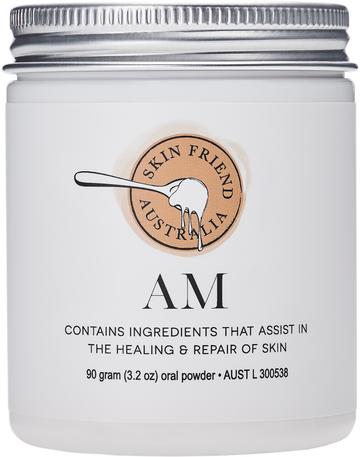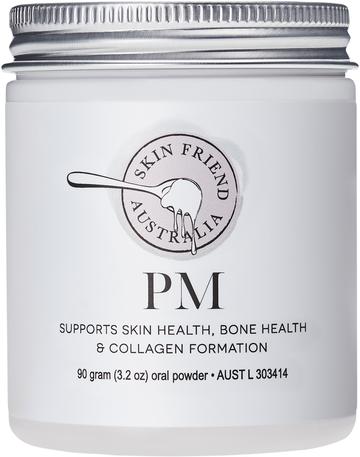Calcium is the most abundant mineral in the body and high levels are found in healthy, rash-free skin. Calcium deficiency signs include eczema, anxiety, hyperactivity, depression, heart palpitations and food sensitivities.
Calcium boosts the acidity of the skin’s acid mantle, which can increase the skin’s ability to protect itself against dust mites and infections.
Calcium also helps to maintain the right amount of moisturising lipids in the epidermis layer of the skin, by triggering lipid production.
When I was developing Skin Friend PM, we tested a range of calcium supplements to find the best. The following types of calcium are what we tested and this is my unbiased calcium review.
I say "unbiased" as we could have chosen any type of calcium when formulating Skin Friend PM. So I want to share with you my thought process and research that led to the final calcium formula we chose ...
Calcium Carbonate
Calcium carbonate comes in several types including regular, refined and natural plant calcium from seaweed (which I will cover next). So which is best? My pick is refined calcium carbonate and I'll tell you why shortly.
While calcium carbonate is not the trendy form of calcium that bloggers write about, like calcium citrate, it does have many benefits you may not have been told about...
Calcium carbonate is a salicylate sensitivity remedy, which is awesome if you have chemical intolerances such as salicylate sensitivity (which is common in people with eczema).
How does it work to remove unwanted chemicals from your body?
Calcium carbonate is highly alkalising which helps to alkalise the blood and urine. Research shows the body eliminates excess salicylates when the urine pH reaches 7.5 — and supplementing with calcium carbonate helps you reach this pH, which is how it temporarily reduces salicylate intolerance. It works for a couple of hours.
Using calcium carbonate (to alkalise and for nutritional support) can also help an eczema sufferer to sleep more soundly.
I prefer refined calcium carbonate (must be refined) as this form is purer than other types of calcium, and it's very low in heavy metals, which can naturally occur alongside calcium. While calcium can block or reduce the absorption of other heavy metals, you want to check your calcium supplement is low in lead.
Another benefit of calcium carbonate is that it contains 40% calcium, which is more than what other varieties offer. The elemental calcium content in Skin Friend PM is 300mg of calcium per 750mg, which is 40% calcium, and the remainder is bicarbonate which has many health benefits, including alkalising.
Plant calcium
Plant calcium (also known AlgaeCal) is calcium carbonate that is sourced from seaweed. Great, it's natural so it should be good right?
Not really... it contains higher than acceptable lead levels as far as I (and other health advocates) am concerned (consumer lab report).
After taking plant calcium I also found that I was crazy thirsty all day and this caused discomfort. I did not have this adverse effect then taking any other type of calcium.
At Skin Friend we are often asked "is your calcium natural plant calcium"? People mistakenly think natural must be better. But when you live in a polluted world, purity is better, so "No, we do not use or recommend plant calcium".

Calcium citrate
We tested calcium citrate on eczema patients and I tested it myself for about a year. Ultimately it did not have the alkalising effect that I needed it to have ... As mentioned, when you alkalise the urine (by taking alkaline calcium carbonate), it helps the body to detoxify unwanted chemicals such as salicylates.
What is ultimately wrong with calcium citrate is that it is 80% citric acid and only 20% calcium, so you consume a lot of highly acidic citric acid in order to get a little calcium. Citric acid is helpful to improve digestion of calcium, but it's not needed in crazy high amounts, like in calcium citrate.
For example, if you took 600mg of elemental calcium from calcium citrate, you would also be consuming 2,400mg of citric acid (3g total). That's not great for your gut. As I said before, a little bit of citric acid does you good, but taking a lot when your body might already have 'low grade metabolic acidosis' is not so good.
For this reason, Skin Friend PM contains very small amounts of citric acid, plus magnesium glycinate, to enhance the absorption of calcium. But magnesium is the key here...
You should NEVER take calcium without magnesium as magnesium is needed to help calcium absorption. Magnesium is also a natural 'calcium channel blocker' which keeps calcium in balance for heart health. And you should take vitamin D separately to prevent the over-absorption of calcium, which can put things out of balance in your body. Your body should regulate how much calcium it needs.
One more thing ... Calcium citrate also contains lead. It does have less lead than plant calcium but refined calcium carbonate and regular calcium carbonate are purer calcium options.
The verdict
I have to be honest, after training to be a nutritionist many years ago, it took me years to change my mind about calcium citrate. I was always told 'Calcium citrate is the best'. But it's not...
So at the end of our year-long search for calcium, after checking lead levels and other important factors, we decided to use refined calcium carbonate. It is a super-fine powder that is safe to use at any age, even small children.
While calcium carbonate may not be 'trendy' and what naturopaths vote for, it is the safest and best option and the only type of calcium we are happy to put our brand name on.
Calcium: dosages and food sources
| Calcium (also known as) |
Supplement dosages (milligrams per day) |
Eczema-friendly food sources |
|
Calcium carbonate Calcium citrate |
Infants (AI) 210–270 mg from breastmilk or hypoallergenic (dairy-free) infant formula Children + teens 1–4 years: 200–500 mg Adults 600–800 mg |
100 g (31⁄2 oz) tofu: 350 mg 1 cup calcium-fortified soy milk or rice milk: 300 mg 100 g (31⁄2 oz) sardines: 300 mg^ 100 g (31⁄2 oz) salmon: 200–300 mg^ 1⁄2 cup green soybeans: 130 mg 1 bowl oatmeal/porridge: 99–110 mg 1⁄2 cup white beans: 96 mg 160 g (5 1⁄3 oz) fish fillet: 85 mg 1 cup sweet potato: 76 mg^ 80 g (3 oz) rainbow trout: 73 mg^ 100 g (31⁄2 oz) flathead/flounder: 23–55 mg 1 cup green beans: 55 mg 100 g (31⁄2 oz) cabbage: 40 mg 1⁄2 cup celery: 20 mg 1 cup cooked spelt: 19 mg 1⁄2 cup leeks: 15 mg |
AI: Adequate Intake as per Australian Government guidelines. The RDI is the higher dose, the lower dose is the amount to be taken in supplement form (obtain the remaining RDI via foods).
*Calcium citrate is not part of the program as it is mostly citric acid so it does not have the highly alkalising effect of calcium carbonate.
**You should obtain the RDI of calcium from both supplements and non-dairy food sources.
^Contains salicylates so this ingredient is not suitable during weeks 1–3 of the FID Program.
Notes:
- Take calcium more than 2 hours apart from your medications, iron and zinc supplements.
- High calcium intake helps to block the absorption of some types of harmful heavy metals, but it's better to not consume too much lead and other heavy metals, if you can.
- Calcium deficiency can cause insomnia and poor sleep — so take calcium along with glycine and magnesium to promote a more restful night’s sleep (that's why Skin Friend PM contains calcium, glycine and magnesium).
Products
At Eczema Life, we recommend nutritionist Karen Fischer's low food chemical program (The Eczema Detox) along with additive-free supplements for skin health and wellbeing. Click on the images to view more details:




